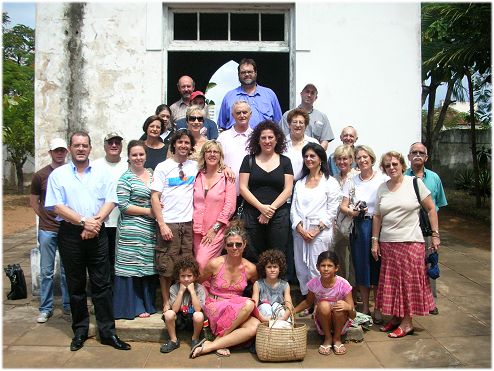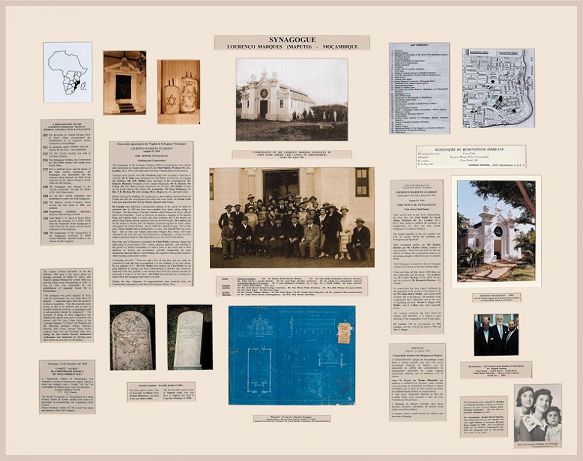|
AFRICAN JEWISH CONGRESS IN SOLIDARITY
VISIT TO
MOÇAMBIQUE - MARCH 2007

Delegation and community members in front of the Ohel at the
Mozambique Jewish cemetery

Collage compiled by Vivienne Pivo
The Jewish community of Maputo, Mozambique, received a welcome boost
last month with the visit of a delegation from the African Jewish
Congress (AJC), the umbrella representative body of the Jewish
communities of Sub-Saharan Africa. After many years of relative
dormancy, Maputo Jewry has shown signs of revival in recent years
and is in the process of reclaiming its century-old heritage
following decades of political and economic turmoil in the country.
Activities took place over the weekend of 23-25 March. South African
participants included AJC representatives Mervyn Smith (President),
Rabbi Moshe Silberhaft (Spiritual Leader), Irene Zuckerman and
Cecile Smollan, Israeli Ambassador Avi Benjamin (who is based in
Luanda, Angola), Union of Jewish Women representative Jenny Kahn,
Dalia Lichtenstein (representing the World Jewish Congress) and
Lawrence and Daphne Miller (Cape Council, SAJBD). A meeting was
scheduled with Mozambique President Armando Guebuza, but this had to
be cancelled due to an explosion at the ammunition compound near the
international airport.
The weekend activities began with a Friday night service, conducted
by Larry Herman from the USA and held in the eighty-year-old
synagogue. To accommodate all the participants, the service was held
in Hebrew, English and Portuguese. Following Rabbi Silberhaft's
sermon, which was translated in to Portuguese by Samuel Levy, Smith
presented Mr Rogerio Levy Fonseca, President of the Maputo Jewish
community, with a collage detailing the history of the synagogue.
The collage was compiled by Vivienne Pivo, whose grandfather was
instrumental in the establishment of the synagogue in 1926.
The service was followed by a Shabbat dinner for visitors and local
community members at the city's famed Polana Hotel. In the course of
the dinner, members of the local community were invited to relate
interesting anecdotes and facts concerning their lives and that of
the Jewish community in Lourenco Marques/Maputo. A copy of the
collage was also presented to Alkis Macropulos, a local gentile who
was responsible for having the synagogue returned to the Jewish
community in 1989.
Following Moçambique’s independence in 1974, the synagogue fell into
disuse and became a place for "bandits, prostitutes and drug
addicts". At some point, it was briefly used as a church. Like other
disused structures, it was also frequently broken into by people
seeking to scavenge wood for otherwise unavailable fuel to survive
the deprivation of the years of civil strife. Eventually the Red
Cross, housed in an adjacent building, acquired the property for
storage.
Macropulos' campaign to restore the synagogue to the Jewish
community included running an advertisement in the country's only
newspaper, Noticias, seeking support, and sending letters to
government and nongovernmental private charities. At the dinner, he
delivered a short message.
On Sunday, the delegation and community members visited the historic
Jewish cemetery, whose earliest graves date back to the late 1870s.
Prior to doing so, they were addressed by Smith, Ambassador Benjamin
and Vivienne Pivo, who spoke on her family's journey to Moçambique
and their involvement in the establishment of the synagogue and
congregation. Benjamin related that his meetings with the Foreign
Minister and various other members of government had shown "a clear
willingness to do business with Israel, not only on an economic
level but on many other levels". Extracts from articles written by
historian Hyman Jocum were also read to give those gathered a deeper
insight into the history of the Jews of Moçambique.
Smith took the opportunity to hand over a donation of fifty chairs,
Hebrew English siddurim and chumashim, Pesach Hagadoth, Jewish books
to establish a library for the community, a large amount of Pesach
supplies for a communal Seder and a cash donation of US$850.00 to
enable the community to purchase Hebrew-Portuguese siddurim, fans,
bookshelves and other items for the shul. The much-needed repair of
the ceiling of the shul was also discussed. It is hoped that the
arrival of Rabbi Mordechai Makor will assist with the increase in
regular services and communal activities.
Extensive restoration work has taken place at the cemetery through
the AJC and the local community. When this commenced in 1992, the
plot was a garbage dump and a homeless person was living in the Ohel.
The walls were raised, tombstones repaired and re-erected and tons
of garbage removed, in the process of which more graves were
discovered. Water was piped in and trees grass and flowers were
planted. Today, the cemetery is in good repair and is guarded 24
hours a day.
SHABBAT
VAYIKRA DRASHA
DELIVERED BY RABBI MOSHE SILBERHAFT
23 MARCH 2007 - MAPUTO SYNAGOGUE MOÇAMBIQUE
The rabbis of the Talmud placed great emphasis upon
proper preparation for good deeds. The Talmud uses the phrase
hazmana milta – preparation is most important. This is undoubtedly a
great idea in all areas of life.
In Judaism all of life is viewed as being a series of stages of
preparation. The rabbis in Avot characterized this world and our
mortal lives as being the “foyer” of the palace and the World to
Come, the eternal world of our souls, as being the palace itself.
They admonished us to prepare ourselves in the foyer in order to
gain proper admittance to the palace itself. So preparation is
undoubtedly one of the key traits of Judaism.
Preparation comes in many different forms and shapes. The holiday of
Pesach which is almost upon us requires a great deal of physical
preparation, more so perhaps than any other holiday on the Jewish
calendar. Cleaning the house, removing the chametz, baking the
matzot, koshering utensils.
But Jewish tradition always demanded a spiritual preparation as
well. Not only do we need to have clean houses, we are also to have
clean souls and minds, a clarity of vision and a strong sense of
holy purpose. It is far easier to remove the physical chametz from
our homes than to dislodge the spiritual chametz that infects our
souls, personalities and behavior.
While the removal of physical chametz and physical preparation for
Pesach requires hustle and bustle, strain and exertion and many
times frustration and impatience, the removal of spiritual chametz
demands calmness, contemplation, concentration and a good deal of
tenacity and patience.
There really is no shortcut to becoming a truly free person, in the
highest Jewishly spiritual sense of the word. Intense preparation is
required in order to achieve that goal.
In his closing remarks at the consecration of this synagogue on 29
August 1926 Chief Rabbi Dr Landau said, “there are only a few of you
hear, but you nobly set yourselves a task and have accomplished it
in the building of this little shrine.”
My dear friends, there are some people who when called upon to help
build the future try to avoid the cost of consecrated effort and do
not give their best. They fail to understand that they are building
for themselves and for their children.
Since 1989 when the synagogue was returned to the Jewish community,
through the efforts of Alkis Makropolis, a few of you set yourselves
a noble task to restore this little shrine, “you have done well”.
3319 years ago, on Rosh Chodesh Nissan, which we celebrated this
past Tuesday the first sanctuary which G-d instructed the Jewish
people to build in the desert, was consecrated.
It is interesting that we are gathered here this evening, to
rededicate this little synagogue, during the Jewish month of Nissan.
The opening word of this week’s parsha and of the entire book that
we now begin to read raises a basic question. Vayikra means that
God, so to speak, called and spoke to Moshe. The rabbi took notice
that the word vayikra as it is spelled in the Torah ends with a
small-sized alef.
The rabbis inform us that the small alef in vayikra is indicative of
the great modesty of Moshe. That very modesty and humility, the
feeling that one should not overly indulge in in their self
importance, no matter what position of public importance one fills,
is the main reason that God “speaks” to people and guides them in
their leadership roles. The Talmud teaches us that God detests
arrogance in human beings generally - and in public leaders
especially.
My dear friends, in conclusion let us re-validate our belief in the
sublime proverb expressed by the prophet Zechariah, "Not by might
and not by power, but by My Spirit, says the Lord of hosts."
To this eternal truth do we rededicate this synagogue. We should
make of this synagogue not a refuge from the anxieties of the world,
but a renewed source of strength for waging the struggle for
justice, freedom and peace. To this end we rededicate this
synagogue. To this task do we rededicate ourselves.
Invisibly embedded in your synagogue is a firm unwavering hope for
the future. The forebears founded and organized a congregation, not
for themselves alone, but for those who would follow.
On this special day, we rededicate your community, not simply in the
faith that there will be a future, but also in the conviction that
the future will be congenial to the ideals and values cherished by
your predecessors and by you.
Let us dream of those who will succeed you - whose lives "will shine
as the brightness of the firmament’’ because the religious
imperatives of their existence will stem from this synagogue.
In the presence of those gathered here this Shabbat, before the Lord
our God we rededicate this synagogue and your community.
We rededicate it, as did your predecessors to the Worship of God and
the Service of Humankind.
Amen and Shabbat Shalom
|

